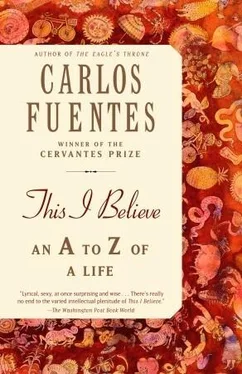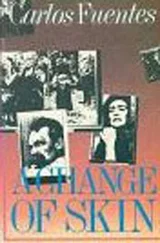Sancho Panza infuses this démarche— step, approach, demarcation — with its wildest meaning when he, the squire, the very representative of earthly realism, becomes the ersatz governor of the island of Barataria and, just like his master, Don Quixote, must act (though less happily) in another fiction within the fiction.
Shakespeare has his anti — Sancho Panza: the pompous Polonius who, in the most satisfying manner, declares his lack of respect for genre (which he obviously respects because genre is respectable and he is the guardian of courtly respectability) when he extols the virtues of the company of actors that has just arrived at Elsinore. “The best actors in the world, either for tragedy, comedy, history, pastoral, pastoral-comical, historical-pastoral, tragical-historical, tragical-comical-historical-pastoral, scene indivisible, or poem unlimited.”
The limited and divisible worlds of Shakespeare and Cervantes reject the unity of the indivisible, the poetry of eternity. The man of La Mancha and the Bard of Avon are here and now, for they are men of the Renaissance. One is more sorrowful than the other because his Spanish history is flagging, exhausted by the imperial impulse to circumnavigate the globe and conquer a new world, and drained by persecution and intolerance toward its Arab and Jewish traditions. For this reason Cervantes adopts the mask of comedy. But then the other is even more sorrowful because he harbors no illusions about the actors that strut across the stage like peacocks for an hour or so, looking back fondly upon some glorious exploits in Rome or Egypt, England or Scotland. For that reason, at the height of the Elizabethan triumph, Shakespeare dons the mask of tragedy.
I don’t think either of the two believes in God but then, neither of them can say so, and if the Englishman believes in the tragedy of will and the Spaniard believes in the comedy of the imagination, both certainly know how difficult it is willfully to hold on to one’s imagination except through “words, words, words. . ”
Quixote the good and Macbeth the bad wish to forget. Hamlet the undecided wishes to remember. But the Quixote character is of the novel; Hamlet and Macbeth, of theater. Quixote uses the mask of comedy; Hamlet and Macbeth, of tragedy. Quixote reads and is read. Hamlet and Macbeth act and are seen. Borges asks himself why we are so bothered by the notion that Don Quixote is a reader of Don Quixote and Hamlet a spectator of Hamlet. He ventures that these inversions suggest, in turn, that if the characters within a work of fiction may be readers or spectators, then we, as readers and spectators, may also be works of fiction. But Shakespeare is theater, spectacle, public space.
One day, when I was with the writer Terenci Moix in Barcelona, I remembered London’s glorious old Gainsborough film studios, maker of movies featuring a Margaret Lockwood who could scarcely squeeze into her plunging necklines even though she hid her abundant bosom so that she might escape at night dressed as a man, to rob highways in the company of James Mason, and, no doubt, to later reward her lover with that very bosom.
Today, those old studios have become condominiums. But in a kind of posthumous artistic tribute, one of Gainsborough’s old soundstages was transformed into a theater for the duration of four months, to host a double bill of drama. On alternating nights, to packed houses, Ralph Fiennes performed two of Shakespeare’s political tragedies, Richard II and Coriolanus. The dashing movie actor, well known for his roles in The English Patient, Schindler’s List, and The End of the A fair, is, above all else, a creature of the stage. His Hamlet, performed on Broadway in 1995, won him a Tony Award. His Richard and his Coriolanus were the kind of award an actor bestows upon himself.
Both are among the most difficult roles of the Shakespearean canon because they are, to put it one way, naked works. In Othello, Romeo and Juliet, and King Lear, the protagonists do not know their fate but the audience does, so clearly that one almost wants to shout out to Romeo, “Don’t kill yourself, Juliet’s alive,” or “Iago is deceiving you. Desdemona is faithful,” to Othello. In Richard II and Coriolanus, the protagonists possess an absolutely perfect knowledge of who they are, and the audience is aware of this as well. In this sense, we have no surprises. What we do have — thanks to the decidedly public nature of both works — is the most intense dramatic reflection on the nature of politics and the exercise of power.
Richard II was written in 1595, between Titus Andronicus, the work of a beginner, and Romeo and Juliet, the playwright’s first major triumph. Richard II is a work about how power is held and how it is lost. There are two Richards. The Richard of the first part feels he has been anointed by God. He embodies the divine right of kings and he exercises this right capriciously. The ceremony gives power an incarnation and Fiennes infuses his character with a ritualistic movement, almost that of a sacred dandy. He is a man with two bodies: one anointed, the other physical. The monarch’s imagination closes in on itself in its attempt to reconcile man and king. Richard’s obsession is that of being king in spite of being a man; in other words, he is obsessed with annihilating the man in order to be king.
Such an enterprise requires a tremendous exercise of imagination and Richard, as he imagines himself, loses his grip on himself and his power. For him, the crown is a decorative accessory. Power, for Richard, becomes an interior fact, the power of the imagination, a lyric metaphysic. Victim of the imagination of power, the king loses all notion of how to exercise that power. His frivolity leads him to behave arbitrarily. His arbitrary behavior sparks the enmity of those people hurt by his power. The mounting list of grievances explode in rebellion. Defeated, Richard learns that his crown is hollow and that the name of his court is Death.
Ralph Fiennes moves deftly from the first Richard, frivolous and autocratic, to the second, beaten and bruised. His pain does not remain inside him. He empties himself of it with a kind of guilty tenderness. His greatness is his defeat, his pain, his woe. History allows him nothing more than to “sit upon the ground and tell sad stories of the death of kings.” In effect, he is telling the world, “You may crush my power and my glory but not my pain.”
Fiennes gives a great performance of a rather unforgiving role in a theatrical work that has its fair share of formalistic flaws. It is absolutely appropriate to pair it with Shakespeare’s most perfect political tragedy, Coriolanus, written in 1607, between Macbeth and Antony and Cleopatra, toward the end of the playwright’s career.
If Ralph Fiennes doubles his breadth as an actor in Richard II, he quadruples it in his performance of Coriolanus. This is a character at war with Rome, his homeland, the enemies of Rome, his mother, and himself. Coriolanus, champion of the Roman patriciate and detested by the city plebes, returns home triumphant from the war with the tribes threatening his city. Elected consul, he manages to turn all the plebeians against him, exiles himself from Rome to join his old enemies, prepares to sack and set fire to the city, until his mother Volumnia is able to dissuade him. But his clemency will cost him his life. In plainer, uglier terms, Coriolanus somehow ends up getting on everyone’s bad side. Except his mother’s. But this is the felicity that will ultimately destroy him, because Coriolanus, in his mother’s eyes, is not a creature made of flesh and bone. He is an icon of power, the product of maternal fantasy. She does not love her son, she loves the military and political conqueror. She does not allow him to be who he is. She wants to make him believe that “a man were author of himself, and knew no other kin.”
Читать дальше












